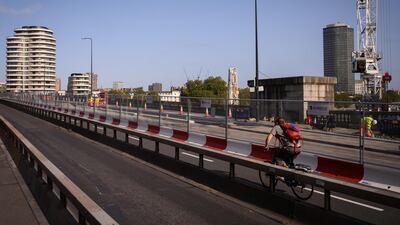Public investment is critical to rebooting economic activity, creating millions of jobs in the post-pandemic era and helping the global economy to recover from the deepest recession in more than nine decades, according to the International Monetary Fund.
Increasing public investment by 1 per cent of gross domestic product during a period of high uncertainty will boost overall GDP by 2.7 per cent over a two-year time horizon, the IMF said in its 2020 Fiscal Monitor Report on Monday.
It will increase employment by 1.2 per cent over the same time horizon, potentially generating between two and eight jobs for every $1 million spent on traditional infrastructure. It is likely to create between five and 14 jobs for the same amount spent on research and development, green electricity and efficient buildings, according to the report, which cited a study of 72 advanced and emerging markets economies.
A 1 per cent increase in public spending will also help to "crowd in" further private investment, which could jump by more than 10 per cent over the two-year period if investments are of “high quality” and if existing public and private debt burdens do not hinder the private sector’s response to the stimulus being offered, it added.
Depressed private investment due to “acute uncertainty” on the future of the pandemic and the economic outlook underlines the need to roll out “high-quality public investment in priority projects”, top officials from the IMF Fiscal Affairs department said in a separate blog on Monday.
“Low interest rates globally also signal that the time is right to invest. Savings are plenty, the private sector is in waiting mode and many people are unemployed and able to take up jobs created through public investment,” the department's director, Vitor Gaspar, deputy director Paolo Mauro, deputy division chief Raphael Espinoza and assistant director Catherine Pattillo wrote in the joint blog.
The Covid-19 crisis has plunged the global economy into the deepest recession since the 1930s. The World Bank expects global output to shrink 5.2 per cent this year, while the IMF sees it contracting 4.9 per cent.
The pandemic has disrupted health and education systems around the world, forcing governments to prioritise spending on saving lives and containing the virus. Policymakers in some countries have diverted financial resources away from some public sector projects to focus on combating the immediate aftermath of the health crisis.
Even before Covid-19, public investment-to-GDP ratios in most economies were already declining and infrastructure spending had not kept up with needs.
Public investment will be lower this year than in 2019 in 72 out of 109 emerging markets and low-income developing countries. Public spending is set to fall by an average of 1 per cent of GDP for these nations, the IMF said on Monday, citing data from the upcoming October 2020 World Economic Outlook, which is scheduled to be released later this month.
The IMF said in some emerging market economies where interest rates are low, scaling up public investment can generate significant economic activity and absorb excess private savings without excessively increasing borrowing costs.
In other low-income economies with high levels of debt, however, the picture is different - particularly for those borrowing in foreign currencies.
“In these countries, policymakers will need to safeguard public investment, to the extent compatible with saving lives and livelihoods, and enhance its efficiency,” the IMF's report said.
Beyond its macroeconomic implications, public investment is also essential to raise long-term economic growth, to progress towards the UN’s Sustainable Development Goals (SDGs).
The additional investment needed each year until 2030 to reach SDGs for roads, electricity, water and sanitation has been estimated at between 2.7 per cent and 9.8 per cent of GDP in emerging markets and low-income developing countries respectively, the report said.
“In the long term, public investment in infrastructure can help reduce inequality by fostering structural transformation, which also facilitates regional convergence between rural and urban areas in low-income economies,” the IMF said.
“Priorities include developing well-resourced and better-prepared healthcare systems, expanding digital infrastructure and addressing climate change and environmental protection.”


